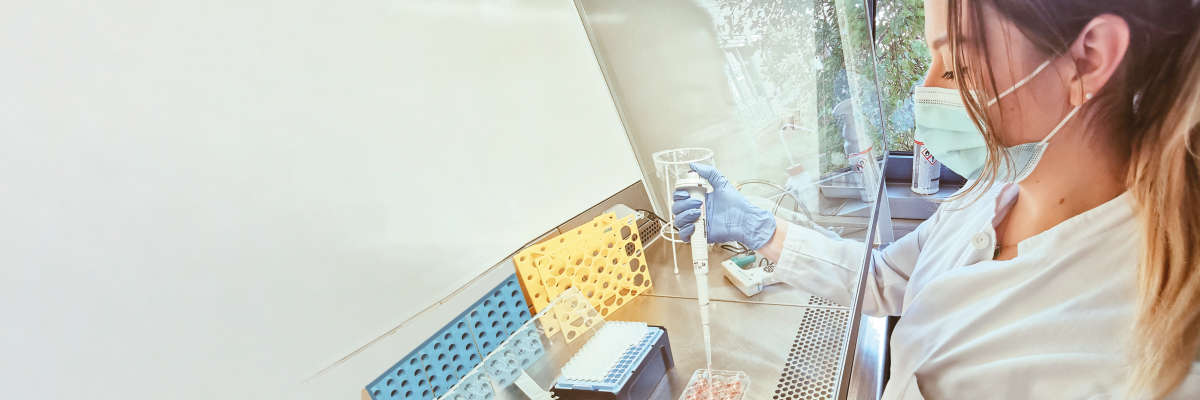
Olivia Stencel has just returned from studying in Hong Kong and is now at the Heinrich Heine University in Düsseldorf, researching how environmental triggers can prevent or cause childhood leukemia.
What sparked your interest in cancer research?
Since my BSc in biotechnology, I've been interested in medical sciences, particularly oncology. It's such a fascinating topic. It's so heterogenous; every cancer is different, so I'm always curious to see what researchers can find out. And the more I study it, the more I realize how many lives are affected by it. During my placement in Hong Kong, I worked on liver cancer, and now I'm researching childhood leukemia.
Can you tell us more about your research on leukemia?
The project I'm working on is looking at environmental triggers that protect or cause leukemia. Leukemia is heritable, but you usually need a mutated gene plus a second trigger to develop leukemia. In developed countries, the rate of leukemia is much higher than in developing countries. It's thought that this could be connected to living in a more sterile environment.
Children who get their first infection very early in life have a primed immune system. So when they get their second infection, the immune system is ready to produce cytokines and effectively fight off the infection. It's believed that this trained immunity early in life may also play a protective role against leukemia.
In our lab, we use cell lines and mice that have the human mutation for leukemia. We then expose them to a virus to see how they react to their primary and secondary infections and observe whether the timing of these infections can protect or cause leukemia.
Is this a topic you would like to continue working on after your MSc?
I would like to continue working in oncology or maybe stem cell research as there is some overlap.
At the moment, I'm looking for Ph.D. projects in Germany, but I'd also consider going abroad again if the project fits. Working in industry could also be a good option for me as I already have some experience. During the first year of my MSc, I did a placement in the R&D instrument department at QIAGEN. I had a great time and enjoyed the mix of office and lab work.
Why did you decide to study abroad, and why did you pick Hong Kong?
I’ve always wanted to live abroad, and studying is a great way to get that experience. I picked Hong Kong because I enjoy photography. There are a lot of photographers in Hong Kong, and there's so much to see – the incredible architecture and landscape got me interested in the city. It was also relatively easy to find a lab doing research in my direction.
What was it like living and working abroad?
It was a beautiful experience.
I enjoyed the intensity of city life and the diversity of the environment - from bustling streets to ocean views and mountains. It was easy to find cool spots and meet new people just walking around. It was so nice because everyone was asking questions like, "did you try this restaurant? Did you visit this place?" It was great to get recommendations, and it was fun to share different interests and cultures.
The lab work was similar, but the organization was a bit different. The university campus was also huge and spread all over the city, so that was a little intimidating at first. It's more unusual to find foreigners in a working environment, so people were interested in getting to know me.
How was traveling during a pandemic?
Getting a visa was pretty stressful because the offices were closed, and I also had to quarantine in a hotel for three weeks when I arrived. I also couldn't do as much traveling outside of Hong Kong as I would have liked.
What advice would you give someone considering an MSc and placement abroad?
In my experience, MSc work is a lot easier than undergraduate studies. You can choose what you're interested in, explore different topics and decide what is and isn't for you. It's great to get into the lab and see how it work as a real working scientist.
I would definitely recommend a placement abroad. First, go online and search for projects you're interested in. Almost every lab will have a description of their research, publications, and an email address to contact. Most PIs appreciate you contacting the lab directly and are open to accepting students, especially if you already have your own funding. Some universities also have an international office you can get in touch with.
I would also recommend finding out what paperwork is needed early on to have everything ready to go when needed. If you do an ERASMUS project, some of this will be arranged for you by your university. However, if you decide to go further afield, be prepared to do most of the organization yourself. You can also apply for financial support. I was had extra funding from the German government towards flights and a monthly allowance; that's one thing that really helped.
You mentioned your interest in photography, what other hobbies do you enjoy doing outside of the lab?
Yeah, I started photography around four years ago. I love visiting new cities, looking for cool spaces that most people don't go to and seeing them from a different perspective. I also like going to the gym and drawing to get my mind off things. It's great to have a creative outlet. When working in a lab environment, it can be a lot of excel sheets, organization and logical thinking. Creative hobbies can help you to see things differently; there's more freedom and less time pressure.


